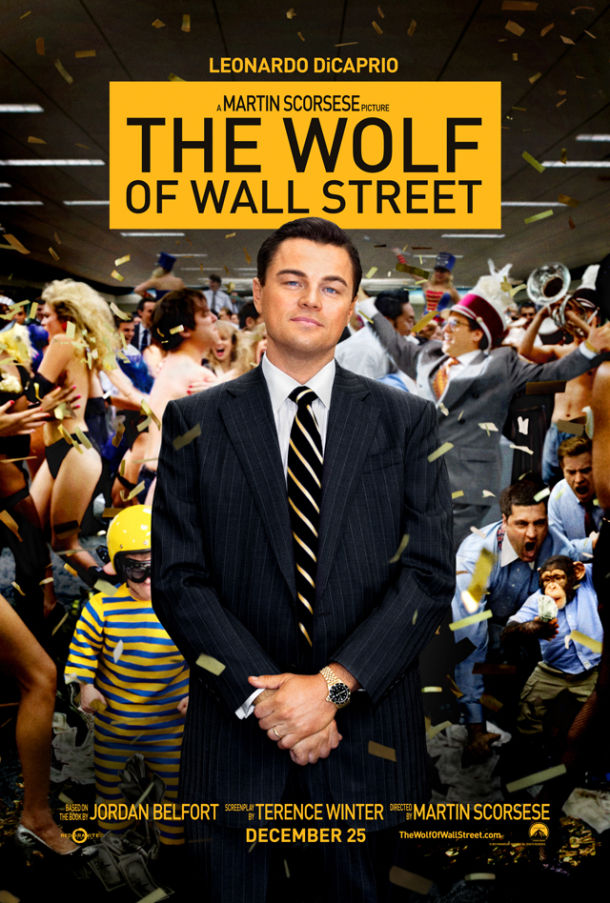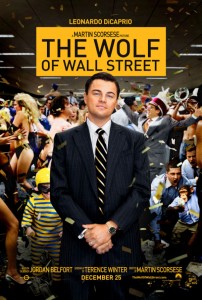Review: The Wolf of Wall Street


It’s all fun and games until someone becomes motivated solely by greed. At least, that’s what you learn from Martin Scorsese’s, The Wolf of Wall Street.
Collaborating together for the fifth time, three-time Academy Award nominee Leonardo DiCaprio stars as Jordan Belfort in Scorsese’s satirical biographical black comedy. Based off his own memoirs and experiences, the film chronicles Belfort’s unbelievable climb from a young eager stockbroker novice, to a casualty of the infamous Black Monday catastrophe, to a silver-tongued con artist.
Belfort proves to be such a natural born salesman that, seemingly as soon as he creates his own firm, he and his motley cru of salesmen, including Donnie Azoff, played by Jonah Hill, have more money than they know what to do with. So what do they ultimately decide to do with that extra cash? They blow it on yachts, trophy wives, hookers and obscene quantities of cocaine, obviously.
From the moment the movie begins, Belfort is forthright about the ecstasies of money‚— the drugs, women, cars and other toys it allows him to buy, and above all the rush of acquiring more — and indifferent to anything else.
Soon the firm and its unorthodox methods attracts the attention of an ambitious FBI agent, played by Kyle Chandler, who vows to imprison the drug-fueled Belfort, who eventually gets indicted for money laundering and securities fraud.
Scorsese uses the life of Belfort to teach a tale that has been told a million times over: greed is bad. Drugs are bad. Consumerism is bad. Self-indulgence and instant gratification is bad. However, we as the audience only acknowledge these themes through Scorsese’s usage of dark humour and satire.
By having DiCaprio’s character breaking the fourth wall, the imaginary “wall” between the audience and the character, Scorsese utilizes the character to appeal to the audiences about the vices that have the potential to build — and ultimately diminish — great people.
As a self-proclaimed Leonardo DiCaprio aficionado, I personally believe that this was one of his best roles thus far. Only playing a villain one other time in his lengthy career, DiCaprio morphs into a man that embodies an unbelievable shallowness and lack of insight, traits not seen in DiCaprio’s previous roles.
Belfort is a thoroughly despicable excuse for a human being, but one whose charm, which is a direct result of DiCaprio’s still-boyish grin, makes aggressively despising him almost not possible, and you as an audience member feel guilty for it. It says something about DiCaprio’s attractive charm that you almost want him to get away with the crimes he is knowingly committing.
Already nominated for a Golden Globe for his portrayal of Belfort, I would be shocked if DiCaprio doesn’t get an Oscar nomination (or even the award finally).
An impressive performance comes from Jonah Hill, who portrays DiCaprio’s buck-toothed sidekick and right hand man. Known for being typecast as an overweight goof with a tendency to say one too many fart jokes, I was at first hesitant if Hill would be able to carry on a demanding role alongside actors such as DiCaprio.
This movie showed audiences that Hill is much more than the “funny fat one.” He shows an impressive range of his acting ability as a so-called “serious” actor, while being sure to still paying homage to his comedic roots.
Something that is duly worth noting is the depiction of sex in this movie. If you are expecting the sex scenes to be loving and tender, you’re putting your money in a place where it doesn’t belong. The sex scenes are raw and unemotional. The nudity, from both the women and DiCaprio himself, happens so frequently that the audience becomes immune to it and become unfazed by it all. This continues to go along with the theme that superficiality is another dominant theme.
Though the film certainly does deserve the hype that it has been receiving in the media, there are a few notable flaws that are hard to get past and stop this movie from being extraordinary.
The most notable flaw of this film is the length. Just a minute shy from being three hours, the film tends to repeat itself, showing one scene after another of grown men getting high, participating in orgies and behaving badly at the office. While the running time could mirror the film’s argument that extravagant excess is dangerous, Scorsese could have proved all that he wanted to prove in two hours, at the most. Maybe even less.
Whether you see this movie because of the multi-layers of scandals, the clever filming or because DiCaprio, The Wolf of Wall Street will not disappoint. You’ll walk out of the theatre knowing that there will be a sufficient amount of Oscar Buzz surrounding this movie.


